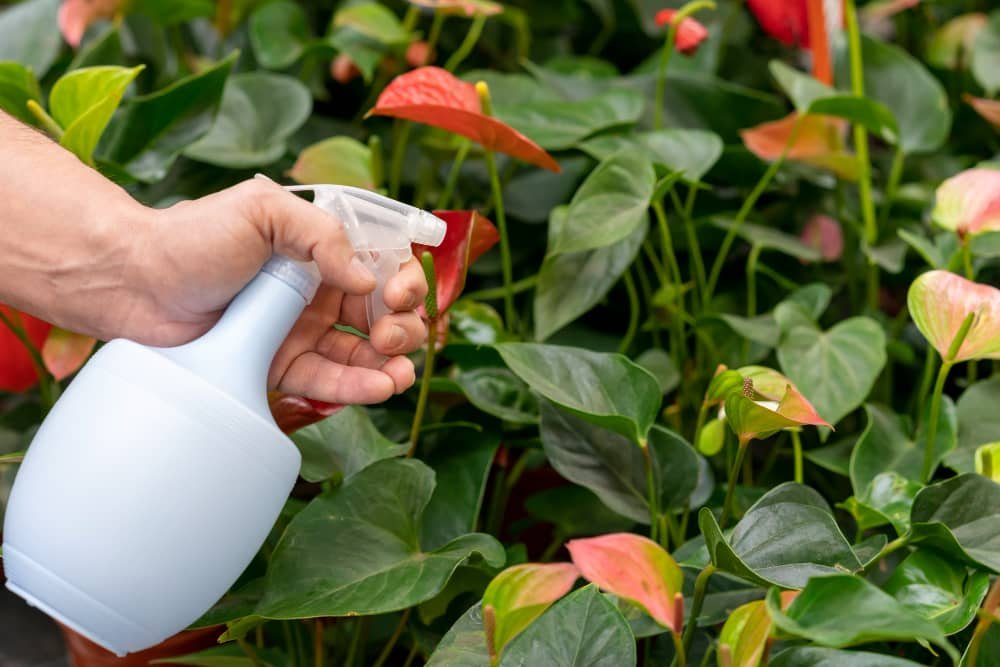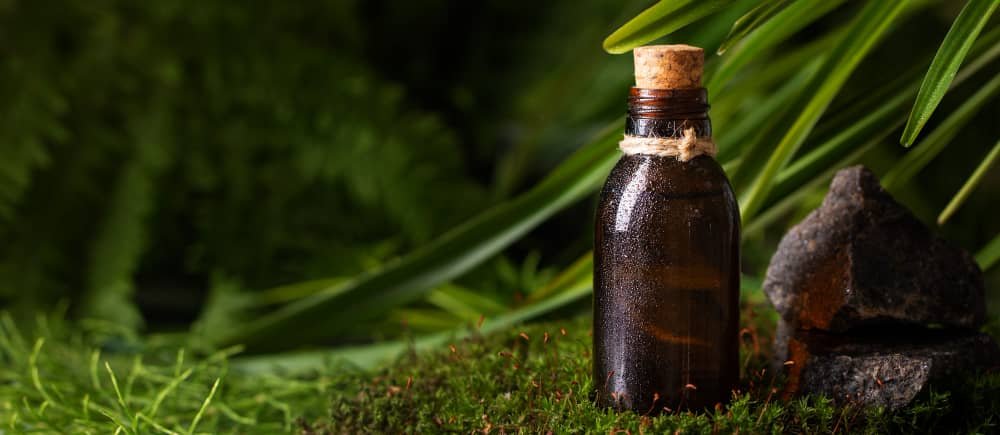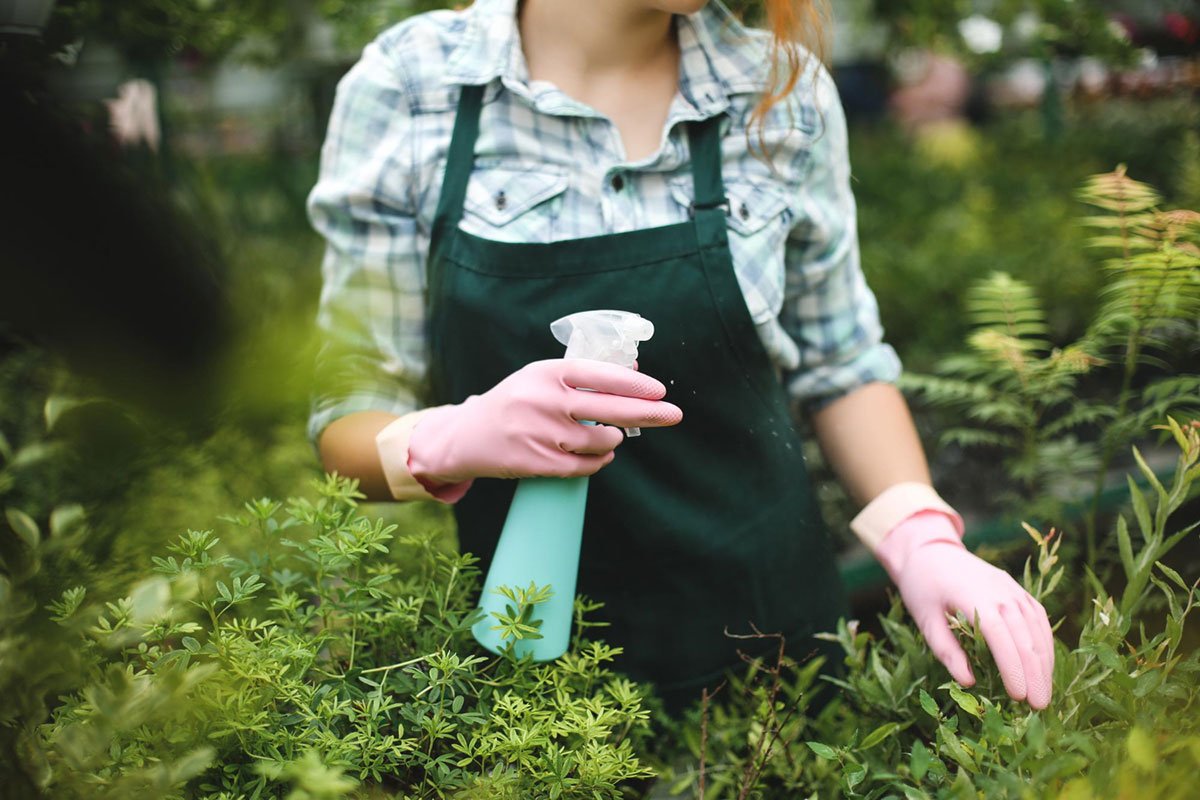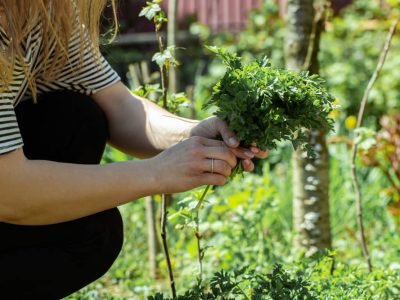Homemade fungicides are not only cost-effective and eco-friendly, they’re also easy to prepare and use. Whether you’re growing vegetables or flowers, these simple recipes will help keep your plants healthy and thriving throughout the growing season.

Homemade Fungicides to Keep Your Garden Healthy
Gardening can be a therapeutic and rewarding hobby, but it comes with its own set of challenges. One of gardeners’ most common problems is fungi growth on their plants. Fungi are parasitic organisms that thrive in warm and damp conditions, causing diseases like powdery mildew and black spot to spread rapidly.
Vinegar
Vinegar is one of the most common ingredients in a kitchen pantry, and it can also be used to make an effective fungicide. The vinegar’s acidity helps kill off fungi, and it is particularly effective against powdery mildew and black spot. Vinegar fungicides are generally safe and do not harm beneficial insects.
Benefits of Using Vinegar as a Fungicide:
Vinegar is an all-natural fungicide safe for fruits, vegetables, and ornamental plants. It is a very cost-effective solution, and it can treat various diseases caused by fungi, such as powdery mildew, black spot, and mildews. Vinegar is also effective against certain bacteria, such as E. coli.

How to Prepare and Apply the Vinegar Solution:
Preparing a vinegar fungicide is easy and only requires a few simple ingredients. Begin by filling a spray bottle with one cup of white vinegar and one tablespoon of liquid dishwashing soap. Shake the bottle to mix the ingredients, then spray the solution onto the affected areas of the plant. Ensure to coat the plant thoroughly; repeat this process every seven to ten days.
When using a vinegar fungicide, it is important to take precautions to avoid damaging the plant. Be sure to spray the vinegar solution early or late afternoon when it is not too hot outside. This will help prevent the burning the foliage. Additionally, it is best to avoid spraying the solution on new growth, as this can cause discoloration.
Finally, remember that vinegar is an acid and can damage certain plants, so it is always best to test the solution on a small area before applying it to the entire plant. This will help to ensure that the vinegar will not be too harsh and burn the plant.
Baking Soda
Baking soda is one of the most common ingredients used in homemade fungicides. It is a natural, safe, and effective way to treat fungal problems in the garden. Baking soda is a relatively inexpensive option and can treat a wide range of fungal illnesses.
Baking soda has many benefits when it comes to treating garden fungi. It is a contact fungicide, which means it works by contacting the fungus and killing it. Baking soda is also a great preventative measure as it can interfere with the growth of fungal spores and stop them from taking root in the soil. Baking soda is also non-toxic, making it safe for children and pets.
Mix one tablespoon of baking soda with one gallon of water to prepare a baking soda solution. If you are dealing with a particularly stubborn infection, you can increase the baking soda concentration to two tablespoons per gallon of water. Once the solution is prepared, spray the affected and surrounding areas liberally. The solution should be applied every 7-10 days for best results.
When applying a baking soda solution, it is important to be aware that this solution can damage certain plants. Read the label and ensure the solution is safe for the plant you are treating. Baking soda is also effective against all fungal illnesses, so identify the type of fungus before you begin treatment.
Baking soda is an excellent option for anyone looking for an effective, safe, and inexpensive way to treat garden fungi. It is easy to prepare and apply, and it can help keep your garden healthy and free of fungal illnesses.

Neem Oil
Neem oil is a naturally occurring, biodegradable pesticide derived from the seeds of the neem tree. It has been used in agricultural and traditional medicine for centuries and has become increasingly popular as a natural pest solution. Neem oil is effective against various insects and fungi, making it an ideal choice for use as a fungicide.
When used as a fungicide, neem oil can be effective against many fungi, including powdery mildew, rust, black spot, and leaf spot. Neem oil contains azadirachtin, a natural insect growth regulator that disrupts the growth and reproduction of pests. Neem oil also has fungistatic properties, meaning it can prevent the growth of fungi.
Benefits of Using Neem Oil as a Fungicide:
Neem oil is an effective fungicide due to its ability to disrupt the growth and reproduction of pests and prevent the growth of fungi. It is also a natural, non-toxic alternative to chemical fungicides. It is safe to use around children, pets, and beneficial insects and has no long-term residue.
Additionally, neem oil is a biodegradable pesticide, which will break down in the environment over time without leaving any damaging effects behind. Neem oil is also easy to apply and can be used as a preventative measure and treatment for existing pests or fungal problems.
How to Prepare and Apply the Neem Oil Solution:
Neem oil can be purchased in a concentrated form or as a ready-to-use spray. If using the concentrate, it should be mixed with water according to the directions on the package label. The ready-to-use spray can be applied directly to the affected plant or area.
When applying the neem oil solution, it is important to ensure that all leaves are completely covered and that the solution is applied at least twice in seven days. To ensure a thorough application, use a spray bottle to lightly mist the leaves from top to bottom.
In order to get the most out of the neem oil solution, it is best to apply it in the early morning or late evening when temperatures are cooler and the sun is not at its strongest. This will help to ensure that the neem oil is not damaged by heat and will be more effective in keeping your garden healthy.
Safety Precautions:
Before using neem oil, it is essential to read and understand the instructions on the package label and to wear protective clothing, such as gloves and goggles. Additionally, it is essential to ensure that all plants are correctly identified before applying the neem oil solution.
It is also important to dispose of any leftover neem oil solution properly to avoid potential harm to humans, animals, or the environment. Neem oil should not be used on edible plants, as it may be harmful if ingested.
Rubbing Alcohol
Rubbing alcohol, also known as isopropyl alcohol, is an excellent fungicide that can be used to treat a wide variety of garden illnesses. It’s a powerful disinfectant and is a great alternative to harsher chemicals, which can be toxic to plants and animals.
Benefits of Using Rubbing Alcohol as a Fungicide
Rubbing alcohol is an excellent option for treating several garden diseases. It effectively kills fungi, prevents them from spreading, and reduces bacteria in plants. It can also control insects like mealybugs, spider mites, ants, and aphids. It’s also safe for humans, animals, and the environment, making it a safe alternative to synthetic fungicides.
How to Prepare and Apply the Rubbing Alcohol Solution
To prepare a rubbing alcohol solution, mix one-part rubbing alcohol to four parts water. This solution can then be sprayed onto affected plants to kill the fungi. It’s important to cover all plant parts, including the top and underside of the leaves.
It’s best to apply the solution early in the morning or evening, as this is when fungi are most active. If possible, wait a few hours after applying the solution before watering the plants, as this will allow the solution to be absorbed into the plants.
It’s also essential to monitor the plants after applying the rubbing alcohol solution. Once the fungi have been killed, the answer may need to be reapplied to prevent the fungi from returning.
Safety Precautions
When using rubbing alcohol as a fungicide, taking a few safety precautions is important. First, it’s important to wear protective clothing such as gloves and protective eyewear when preparing and applying the solution.
It’s also important to ensure that all plants are correctly identified before applying the rubbing alcohol solution, as it can damage some plants. Finally, it’s important to dispose of any leftover rubbing alcohol solution properly, as it can be harmful if ingested.
In conclusion, rubbing alcohol is a great option for treating garden diseases. It’s an effective fungicide that can be used to treat a wide variety of garden illnesses. It’s also safe for humans, animals, and the environment, making it a great alternative to harsher chemicals. When using rubbing alcohol, it’s essential to take safety precautions and to monitor the plants after applying the solution.
Garlic
Garlic is a powerful and natural fungicide that can keep your garden healthy and disease-free. Not only is it a natural and effective way to keep your garden free of fungi, it also has several other benefits. Garlic is known to have antibacterial, antiviral, and antifungal properties, which makes it a great choice for encouraging a healthy garden.
Garlic is particularly effective against powdery mildew, a common problem in gardens. It is also effective against other fungal diseases such as rust, scab, and black spot. When applied to affected plants, garlic can help stop the spread of disease, prevent further infection, and help the plant to recover from the infection.
You must purchase a small amount of garlic to make a garlic spray. Make sure to buy organic garlic if possible. Peel the garlic cloves and chop them into small pieces. Place the garlic and enough water to cover it in a blender, and blend until the garlic is completely mashed up.
Strain the liquid through a cheesecloth and pour it into a spray bottle. Keep any leftover garlic paste in a covered container in the fridge, which can be used for up to two weeks.
To apply the garlic spray, cover the infected plants entirely. Spray the tops and bottoms of the leaves, as well as the stems and soil. You can dip a cotton ball in the garlic solution and apply it to the infected area.
It is important to note that garlic spray can be toxic to some beneficial insects, such as bees and butterflies. To avoid killing beneficial insects, apply garlic spray at night or when the temperatures are more relaxed. Applying the spray on a cloudy day is also essential, as garlic is photosensitive and can cause damage if used under direct sunlight.
Garlic spray can be smelly, so wear a face mask and protective clothing when applying it. When using the spray, it is also essential to keep children and pets away from the area.
Garlic spray can be a great way to keep your garden free of fungal infections and diseases. It is a natural and effective way to keep your plants healthy and vibrant. With the right preparation and application, garlic spray can help keep your garden free of fungus and looking its best.
Onion
Onion is a popular and versatile vegetable that can also be used as an effective fungicide to protect your garden. It is especially effective against powdery mildew and rust. Onion has antifungal properties due to its sulfur content, which helps reduce fungi growth. To use onion as a fungicide, cut it in half and steep it in a quart of boiling water for 10 minutes. Strain the liquid and allow it to cool before using.
When applying the onion solution, wear protective clothing and a face mask to prevent irritation or skin reactions. Apply the mixture to the affected areas and leave it for several hours. Repeat this process until all the affected areas are treated. The benefits of onion as a fungicide include its ability to reduce the spread of fungal diseases and its low cost.
Onion is not only a natural fungicide, but it is also safe for use around children and pets. It is also an economical solution that is easy to find and apply. In addition, onion has no harmful effects on plants, so it is safe for all plants.
When applying the onion solution, it is essential to take certain precautions. The onion should only be applied when temperatures are above 60 degrees Fahrenheit. Using a surfactant may also be necessary to help the solution spread evenly. Applying the onion solution in the morning is best since it allows the solution to remain on the plant for extended periods.
Finally, it is essential to note that onion is not a miracle cure for fungal diseases. It is vital to practice regular garden maintenance to prevent these diseases from occurring in the first place. This includes proper watering, fertilizing, and pruning. By taking these preventive steps, your garden will remain healthy and free from fungal diseases.
Milk
Milk is an effective fungicide that is easy to obtain and inexpensive. It can be used to treat a variety of plant illnesses, including mold, mildews, and blights. It is also an all-natural solution, so it has minimal environmental impact.
Benefits of Using Milk as a Fungicide:
Milk is a natural fungicide that is highly effective in preventing and treating common garden fungi. It contains lactic acid, an organic compound that inhibits certain fungi’s growth. It also helps to create an alkaline environment, which is unfavorable for fungal growth.
Additionally, it helps to increase the soil’s pH level, making it less acidic and more favorable for plant growth. The proteins in milk also provide a protective coating on your plants that helps to keep them healthy.
How to Prepare and Apply the Milk Solution:
To prepare the milk solution, mix one-part milk to nine parts water in a spray bottle and shake vigorously. For best results, use skim milk, which is higher in lactic acid. Spray the solution directly onto the infected plant or area, making sure to get the underside of the leaves and stems. Reapply the solution every few days until the infection has cleared.
If you want to increase the effectiveness of the milk solution, you can add a teaspoon of baking soda or a tablespoon of vegetable oil. Baking soda will increase the solution’s alkalinity and help prevent the spread of the infection. The vegetable oil will help create a protective coating over the leaves, which will help keep the fungus from returning.
When to Apply Fungicides:
Applying the milk solution at the first sign of a plant illness is important. This will help prevent the infection’s spread and keep your plants healthy. Reapply the solution every few days until the infection has cleared.
Use the milk solution in combination with other homemade fungicides for best results. This will help to ensure that your plants remain healthy and free of infection.
With regular application and maintenance, the milk solution can effectively keep your garden healthy and free of fungal infections.
Preparation and Application
Depending on your chosen ingredient, there are many ways to prepare homemade fungicides. It is important to be mindful of safety precautions when preparing and applying fungicides. Learning how to prepare and apply the fungicide correctly is also important to get the best results.
When preparing and applying homemade fungicides, wearing protective clothing, such as gloves, glasses, and a face mask, is important. It is also essential to test the fungicide on a small part of the plant before applying it to the whole plant.
It is best to apply fungicides in the early morning or late evening when the sun is not as strong. Additionally, it is important to identify all plants correctly before applying fungicides. New fungicides should be disposed of properly.
Finally, it is important to remember that homemade fungicides are not the only way to keep your garden healthy. Organic garden treatments, biological controls, and regular garden maintenance are all critical components of a healthy garden.
Safety Precautions
When applying fungicides, it is essential to take the necessary safety precautions. Fungicides can negatively impact people, animals, and the environment if misused. Therefore, it is necessary to familiarize yourself with the safety measures to be taken while preparing and applying fungicides.
The first and most important precaution is to wear protective clothing. This includes long pants, long-sleeved shirts, gloves, eye protection, and a mask. These items will help protect your skin and eyes from chemical burns, irritation, or allergies. Furthermore, reading the product label and following the fungicide instructions is essential.
Another essential precaution is to accurately identify the plants before applying fungicides. Different types of fungi may require different fungicides. Therefore, knowing what type of fungi has infected your plants and which fungicide will be most effective in treating it is important.
After the fungicide is applied, it is essential to ensure it does not reach any nearby bodies of water, as it can be toxic to marine life. Fungicides should be applied on a dry day, and any leftover fungicides should be disposed of properly.
If you are using homemade fungicides, taking the necessary precautions is essential. Before using any homemade fungicides, testing them on a small area of the plant is crucial to ensure they do not damage it. Furthermore, ensuring the solutions are adequately mixed and applied correctly is essential.
Finally, it is essential to note that fungicides are not a permanent solution. To keep your garden healthy, it is important to practice regular garden maintenance. This includes regular watering, mulching, weeding, and pruning.
By following these safety precautions, you can ensure the proper and safe use of fungicides and maintain a healthy garden.
Alternatives to Homemade Fungicides
For some gardeners, homemade fungicides may not be an option due to availability, cost, or personal belief. In that case, there are some alternatives available that can help maintain a healthy garden.
Organic Garden Treatments: Organic garden treatments are made with all-natural ingredients and are designed to be non-toxic to plants, animals, and the environment. These treatments are made with plant-based ingredients such as mulch, compost, and manure, which can be a natural barrier against disease and pests.
Organic garden treatments also include beneficial bacteria and fungi, which can help improve soil health by breaking down organic matter and nutrients, increasing the availability of these nutrients for plants.
Biological Controls: Biological controls are living organisms that can help control insect pests without harming plants. These organisms include predatory or parasitic insects, bacteria, and fungi, which help keep harmful pests in check without chemical pest control.
Regular Garden Maintenance: Regular garden maintenance is essential for a healthy garden. This includes weeding, watering, pruning, and mulching, which can help promote healthy plant growth. Regular garden maintenance also helps to reduce the risk of disease and pests by removing decaying organic matter and creating an inhospitable environment for harmful organisms.
Finally, gardeners should inspect their plants regularly for signs of disease and treat any affected plants immediately. If possible, gardeners should also research the types of diseases common in their area and be sure to use appropriate treatments for any affected plants.
Organic garden treatments, biological controls, and regular garden maintenance are all viable alternatives to using homemade fungicides in the garden. These methods are not only environmentally friendly but also cost-effective and help promote a healthy garden without using chemicals.
Conclusion
Maintaining a healthy garden is essential for its success and longevity, and homemade fungicides effectively keep your garden free from disease. This article discussed seven different homemade fungicides that can keep your garden healthy: vinegar, baking soda, neem oil, rubbing alcohol, garlic, onion, and milk.
Each of these homemade fungicides has its unique set of benefits and can be used to treat various diseases in your garden. They are easy to prepare and apply and can be used with other organic treatments or regular garden maintenance to keep your garden healthy and thriving.
Before preparing and applying any fungicides to your garden, it is important to take the necessary safety precautions. Wear protective clothing when handling fungicides, and correctly identify all plants before applying any treatments. Also, be sure to dispose of any leftover fungicides properly.
Finally, if you are uncomfortable using homemade fungicides, other organic treatments and biological controls can be used to keep your garden healthy. Regular garden maintenance is also essential for keeping your garden healthy and disease-free.
Following the tips and advice discussed in this article ensures that your garden remains healthy and disease-free. Remember that prevention and early detection are key to preventing disease in your garden, and homemade fungicides can help you keep your garden healthy and thriving.




